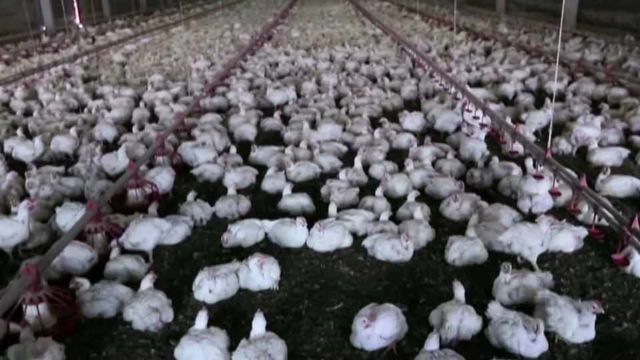China has imposed punitive measures against Brazilian chicken imports after preliminary results of a government investigation found Brazil had been dumping chickens on the Chinese market – hurting the domestic industry.
Brazilian authorities and poultry producers are pushing for the decision to be reversed once the probe is complete. Our correspondent Paulo Cabral has the story.
There’s concern but cautious optimism among Brazilian poultry farmers and exporters regarding Chinese anti-dumping measures.
The Chinese Ministry of Commerce imposed a temporary surcharge of up to 38.4% on Brazilian broiler chickens, arguing its investigation into Brazilian imports showed a flood of imported products sold at below-market prices damaged the Chinese industry.
The Brazilian government reacted with a statement saying that Chinese domestic production has continued to grow in recent years regardless of Brazilian exports and that shipments from Brazil represent only 5% of China’s total demand. The association representing Brazilian animal protein products says it trusts China will lift the provisional anti-dumping measures after Brazilians send further information to the Ministry of Commerce – the Mofcom.
“We don’t make dumping. We respect the Chinese people so much, the People’s Republic of China is a good customer of Brazil, is a good partner of Brazil, and so we hope sincerely with humility that Mofcom will change their mind and not impose restrictions in Brazil because we don’t make it and we intend to keep helping China in the food security of their people,” said Ricardo Santin, the executive director of the Brazilian Animal Protein Association (ABPA).
Brazilian poultry producers have had a rough couple of years facing continued economic and political crises in Brazil, a food safety scandal in 2017 prompting several import embargoes and a recent trucker’s strike which forced farmers to cull about 70 million chickens because feed couldn’t be delivered to the farms.
According to MBAgro’s Cesar Alves, an expert in agricultural products, the anti-dumping measures add to a negative scenario. But he hopes for some recovery in coming months.
“This is bad news for the trade of chicken. We have some problems with Saudi Arabia, too, and Europe. But the second part of the year we should have better prices for chicken and we believe the trade will increase because we are more competitive now with the exchange rate devaluation,” said Alves.
China’s anti-dumping measures against Brazil have been put place just as the United States struggles to regain access to the Chinese chicken market. In February China lifted anti-dumping penalties against the US and is under pressure from Washington to accept more imported chicken in its ongoing trade conflict.
Simon Lester of the Cato Institute discusses global trade disputes
CGTN’s Rachelle Akuffo spoke with Simon Lester, associate director of Cato Institute’s Herbert A. Stiefel Center for trade policy studies about the ongoing global trade disputes.
 CGTN America
CGTN America

